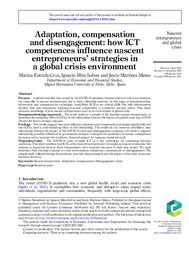Por favor, use este identificador para citar o enlazar este ítem:
https://hdl.handle.net/11000/34357Registro completo de metadatos
| Campo DC | Valor | Lengua/Idioma |
|---|---|---|
| dc.contributor.author | ESTRADA DE LA CRUZ, MARINA | - |
| dc.contributor.author | Mira-Solves, Ignacio | - |
| dc.contributor.author | Martínez-Mateo, Jesús | - |
| dc.contributor.other | Departamentos de la UMH::Estudios Económicos y Financieros | es_ES |
| dc.date.accessioned | 2025-01-11T14:47:27Z | - |
| dc.date.available | 2025-01-11T14:47:27Z | - |
| dc.date.created | 2024 | - |
| dc.identifier.citation | European Journal of Management and Business Economics | es_ES |
| dc.identifier.issn | 2444-8494 | - |
| dc.identifier.issn | 2444-8451 | - |
| dc.identifier.uri | https://hdl.handle.net/11000/34357 | - |
| dc.description.abstract | Purpose – A global crisis like that caused by the COVID-19 pandemic threatens the survival of any business, but especially of nascent entrepreneurs, due to their vulnerable situation. At this stage of entrepreneurship, information and communication technology capabilities (ICTCs) are critical skills that help entrepreneurs develop their new businesses, fostering economic adaptability to counteract adverse effects. This study advances knowledge of how nascent entrepreneurs react in an environment of global crisis. Design/methodology/approach – The study analyzes a sample of 331 Spanish nascent entrepreneurs to determine the mediating effect of ICTCs on the relationship between the impact of a global crisis (e.g. COVID 19) and the firm’s strategic response. Findings – The results suggest that crises influence adaptation and compensation strategies significantly and that ICTCs exert a total mediating effect on this relationship. The results do not, however, establish a clear relationship between the impact of the COVID-19 crisis and disengagement response, but rather a negative relationship, possibly influenced by government attempts to mitigate the pandemic’s economic consequences (economic aid to maintain the workforce, financial support for business model survival). Originality/value – The COVID-19 crisis revealed ICT as a key technology for continuing business operations. This study analyzes how ICTCs affect nascent entrepreneurs’ strategies in crisis environments. Our analysis is important because these entrepreneurs have invested resources in their new project. We must determine their strategic response to crisis environments: adaptation, compensation or disengagement. The sample itself, collected during the pandemic, provides unique insights into the impact of the crisis on nascent business decisions. | es_ES |
| dc.format | application/pdf | es_ES |
| dc.format.extent | 18 | es_ES |
| dc.language.iso | eng | es_ES |
| dc.publisher | Emerald | es_ES |
| dc.relation.ispartofseries | 1 | es_ES |
| dc.rights | info:eu-repo/semantics/openAccess | es_ES |
| dc.rights | Attribution-NonCommercial-NoDerivatives 4.0 Internacional | * |
| dc.rights.uri | http://creativecommons.org/licenses/by-nc-nd/4.0/ | * |
| dc.subject | Nascent entrepreneur | es_ES |
| dc.subject | Adaptation | es_ES |
| dc.subject | Compensation | es_ES |
| dc.subject | Disengagement | es_ES |
| dc.subject | Crisis | es_ES |
| dc.subject.other | CDU::3 - Ciencias sociales::33 - Economía | es_ES |
| dc.title | Adaptation, compensation and disengagement: how ICT competences influence nascent entrepreneurs' strategies in a global crisis environment | es_ES |
| dc.type | info:eu-repo/semantics/article | es_ES |
| dc.relation.publisherversion | https://doi.org/10.1108/EJMBE-06-2023-0174 | es_ES |

Ver/Abrir:
2024-EJMBE_Adaptation, compensation and disengagement.pdf
307,21 kB
Adobe PDF
Compartir:
 La licencia se describe como: Atribución-NonComercial-NoDerivada 4.0 Internacional.
La licencia se describe como: Atribución-NonComercial-NoDerivada 4.0 Internacional.
.png)